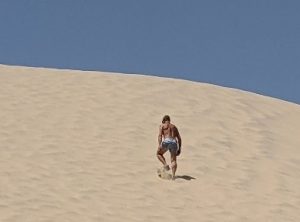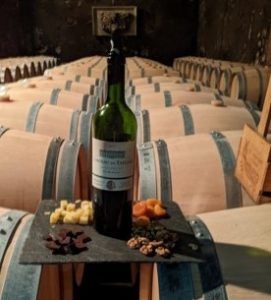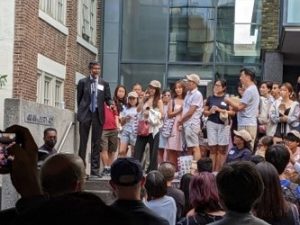Welcome Back to Campus and to the Department for the Start of a New Academic Year
I trust you have all enjoyed a wonderful summer break – productive yet restful – and that you are eagerly looking forward, as I am, to the kickoff of classes and CBE activities this semester.
My summer passed all too quickly, as is often the case! I had a busy start of the summer with travel that took me to Los Angeles, CA and to Bordeaux, France, for the Tosoh Polymer Conference, and the Bordeaux Polymer Conference, respectively. I used the opportunity on the last day of the Tosoh meeting to take a stroll down the Hollywood Walk of Fame.

In Bordeaux, I took a trip at the end to the Atlantic coast, to a town called Arcachon that is the location of Dune du Pilat, the tallest sand dune in Europe. The weather in continental Europe during the time of my trip was brutal – it was 108 F on the day of my visit to Arcachon, and it certainly felt like it. Nevertheless, I managed to climb the installed steps to the top of the dune with my family, and we enjoyed the spectacular view of the bay on the other side. The intrepid gentleman in the photo below was some sort of sand dune jedi – he climbed the dune without the assistance of the staircase, which was incredible given the steepness ascent, and the intense heat of the day! 
I managed also to visit a vineyard, in the Haut-Médoc region of Bordeaux, and learned a bit about the history of wine making in that particular region.
As many of you know, wine making involves a considerable amount of chemical engineering, and the unit operations involved in wine making require mastery if one is to make good wine! If you want to learn more about this, I encourage you to take the course by Profs. Sinno and Diamond if you can, i.e. CBE 5560 The Biochemical Engineering of Wine.
In my time at the vineyard I also learned about the challenges that Bordeaux winemakers are facing due to the effects of climate change. Merlot, which is an important component of many Bordeaux wines, does not fare well in high temperatures, and so the winemaking industry in that region (and others) is scrambling to find alternatives. The clear and present danger posed by climbing temperatures is everywhere to be seen, and in fact a few days after we returned to the US from Bordeaux, we were saddened to learn that heat-amplified wildfires had torn through the forests around Arcachon.

What’s the point of this longer-than-required welcome back email? It is to say that Chemical Engineers have an important role to play in the coming years in helping humankind mitigate, and adapt to, the effects of climate change. (See this page here for a great set of articles from AIChE). Whether through aiding in the development of sustainable plastics (a major theme at both conferences), low cost solar cells, or helping industries adapt to already baked-in temperature rises, chemical engineers are, and will increasingly be at the frontlines of these and related challenges, i.e. all of you, will be at the frontlines as was some sort of sand dune jedi – he climbed the dune without the assistance of the staircase, which was incredible given the steepness ascent, and the intense heat of the day!
I managed also to visit a vineyard, in the Haut-Médoc region of Bordeaux, and learned a bit about the history of wine making in that particular region.
As many of you know, wine making involves a considerable amount of chemical engineering, and the unit operations involved in wine making require mastery if one is to make good wine! If you want to learn more about this, I encourage you to take the course by Profs. Sinno and Diamond if you can, i.e. CBE 5560 The Biochemical Engineering of Wine.
In my time at the vineyard I also learned about the challenges that Bordeaux winemakers are facing due to the effects of climate change. Merlot, which is an important component of many Bordeaux wines, does not fare well in high temperatures, and so the winemaking industry in that region (and others) is scrambling to find alternatives. The clear and present danger posed by climbing temperatures is everywhere to be seen, and in fact a few days after we returned to the US from Bordeaux, we were saddened to learn that heat-amplified wildfires had torn through the forests around Arcachon.
What’s the point of this longer-than-required welcome back email? It is to say that Chemical Engineers have an important role to play in the coming years in helping humankind mitigate, and adapt to, the effects of climate change. (See this page here for a great set of articles from AIChE). Whether through aiding in the development of sustainable plastics (a major theme at both conferences), low cost solar cells, or helping industries adapt to already baked-in temperature rises, chemical engineers are, and will increasingly be at the frontlines of these and related challenges, i.e. all of you, will be at the frontlines as humanity works to blunt the impact of climate change. Whether through CO2 sequestration, improvements in battery technology, or other at scale chemical transformations, you guys are part of the generation that humankind needs to get us through the challenges ahead.
I spent the balance of my summer travel for a Future Faculty development workshop, and a Gordon Conference on Polymer Physics. The month of August however was largely spent getting things ready in the department for the start of the new academic year. We welcomed our new Undergraduate Coordinator, Madison Cunha, to the department earlier this month. For the undergraduate students – she is your first point of contact for all things curricular and extracurricular that are CBE related. She has done a great job getting up to speed on things, and has been squashing bugs and swatting registration issues rapidly in the lead-up to classes. Please say hello and welcome to Madison when you have a chance, whether by email, or in person at the office. We also welcomed a new Graduate Coordinator over the summer, Ashley Culver, as well as a new Coordinator for the Biotechnology Master’s program, Angeline Sandor.

Last week Dean Kumar held a New Student Orientation event for incoming first year undergraduate students and their families, who were out in force. The energy was palpable, and I know the current CBE undergrads (i.e. sophomores , juniors and seniors) will welcome the new CBE first-year students with open arms, and help them get settled into the department and the curriculum.
That’s all for now. I look forward to seeing folks around Towne Building, and around campus. Here’s to AY 22-23!
Chinedum
